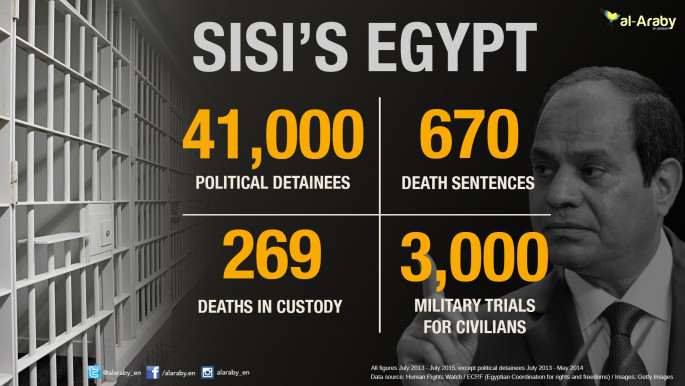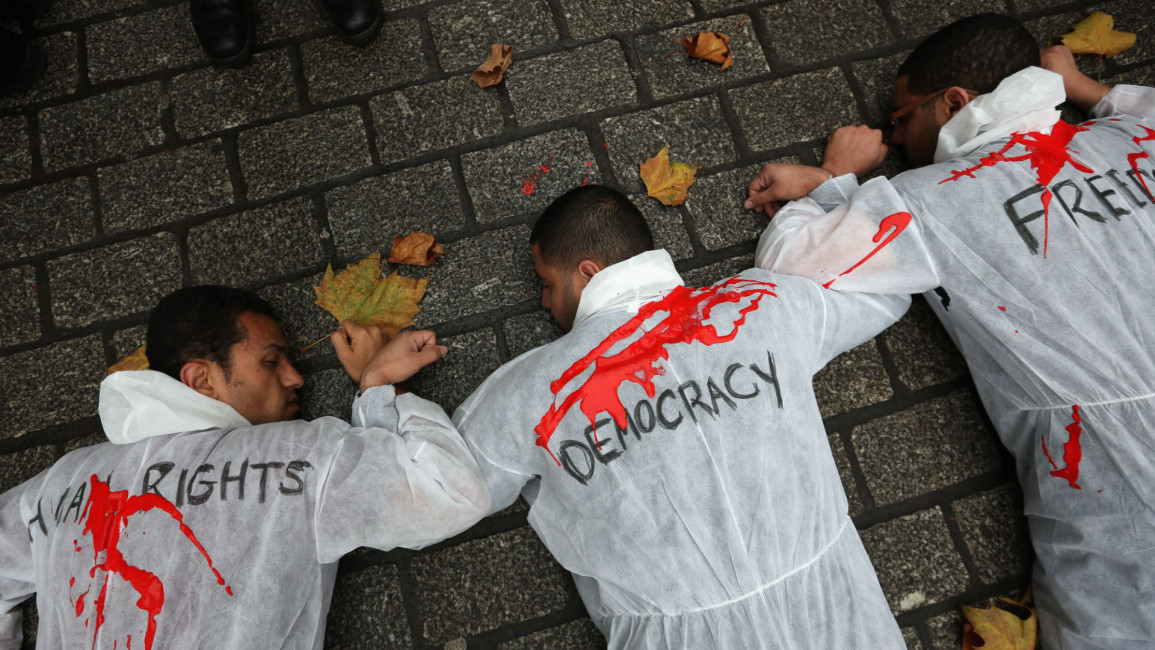Protests greet Egyptian president on his UK visit
Egyptian President Abdel Fattah al-Sisi will hold talks with British Prime Minister David Cameron on Thursday on security and the Sinai plane crash, as campaigners opposed to the visit blocked the entrance to Downing Street, ahead of the meeting.
Around 200 demonstrators protested against Sisi's human rights record. Police removed five anti-Sisi protesters dressed in white boiler suits, who lay on the pavement playing dead while blocking the gates to Downing Street.
Sisi's visit is his first to Britain since he led the Egyptian army's overthrow of his predecessor Mohammed Morsi and critics have accused Cameron of putting trade interests above human rights.
The leaders plan to discuss "security co-operation between both countries" according to the prime minister's office, as well as the crash of a Russian airliner Airbus A-321 in Egypt's Sinai peninsula.
All 224 people on board, mostly Russian tourists, were killed when the plane bound for Saint Petersburg plummeted to the ground 23 minutes after taking off from Sharm el-Sheikh on Saturday.
On the eve of Sisi's visit, Britain suspended flights to and from the Red Sea resort due to new information that suggested a "significant possibility" the crash was caused by a bomb, according to Foreign Secretary Philip Hammond.
Egyptian authorities have played down the possibility of a bomb attack and stressed the need to wait for the results of an international investigation, keen to preserve the country's economically vital tourism sector.
Hammond stressed that the decision to suspend flights was made "very reluctantly," adding, "We have to put the safety and security of British nationals above all other considerations."
Britain said it was planning emergency measures to repatriate holidaymakers from Sharm el-Sheikh, while Cameron is to hold an emergency cabinet meeting on the issue later Thursday.
"We're working with the airlines and the Egyptian authorities now to put in place emergency short-term measures that will allow us to safely bring back the British tourists who are there in Sharm," Hammond said on Sky News television.
"We expect those to be in place by tomorrow so that people whose flights were due out yesterday or today should start to move out tomorrow," he said.
"Those emergency measures will remain in place as we bring out the British tourists who are currently in Sharm el-Sheikh over the next week or 10 days.
Hammond signalled that the resumption of regular flights to the Red Sea resort could take much longer.
"I can't tell you whether that will be days, weeks or months. We very much hope that it will be possible, hopefully before the Christmas-New Year rush, to declare Sharm el-Sheikh safe and to start to resume normal flight operations between the UK and Sharm," he said.
Sisi not welcome
Cameron has faced protests and criticism at home ahead of the trip for welcoming Sisi, who has crushed opposition in Egypt and jailed thousands of people, from Islamist Muslim Brotherhood supporters to secularists and leftists.
The leader of Britain's main Labour opposition party Jeremy Corbyn slammed the visit and British military support for Sisi.
"David Cameron's invitation to Britain of the Egyptian president and coup leader Abdel Fatah al-Sisi shows contempt for human and democratic rights and threatens, rather than protects, Britain's national security," Corbyn said.
"Rather than rolling out the red carpet to President Sisi, the prime minister should suspend arms exports to Egypt until democratic and civil rights are restored."
A crowd of 200 people holding banners reading "stop the repression in Egypt" and "Sisi not welcome" protested outside Cameron's office on the eve of the visit, and more demonstrations are planned for Thursday.
"Cameron has shifted priorities from the rules of democracy and the human rights to trade and investment," Farouk Messahel, from the Birmingham Egyptians Group, told AFP.
A spokesman for Cameron defended the government's stance, saying it was important to discuss issues of "mutual interest" with Sisi, such as combatting terrorism in Egypt and building stability in Libya.
"The stronger our working relationship, the more able we are to have the necessary and frank discussions about the issues on which we disagree," the spokesman said.
 |
|



